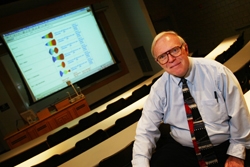Mathematics’ David R. Hill honored for his contributions to online math instruction
Temple Mathematics Professor David R. Hill received the 2008 Mathematics Classic Award from Multimedia Educational Resource for Learning and Online Teaching (MERLOT), for his contributions to online learning and instruction through a web site, Demos with Positive Impact.
Receiving the award with Hill was his collaborator, Lila Roberts, currently dean of the College of Information and Mathematical Sciences at Clayton State University in Georgia.
The award was presented in early August at MERLOT’s international conference in Minneapolis. An international initiative enabling faculty to integrate technology into higher education, MERLOT is an online community of faculty and institutions collaborating to increase the quantity of high quality web-based, interactive teaching and learning materials.
“We were very surprised to receive this award, it just came out of the blue,” said Hill. “We had no idea we were even under consideration for it.”
In selecting Demos with Positive Impact (http://mathdemos.gcsu.edu/mathdemos) for the award, MERLOT’s editorial board stated: “This site is a collection of classroom demonstrations each of which comes with stated objective, prerequisites, instructor notes and platform info, plus the level of the demo and credits. The focus on typical problems and how to help students overcome them contributes to the effectiveness of the material. Many demos provide an enhancement for activities that already happen in classes.”
Demos with Positive Impact is a contributory web site that was developed by Hill and Roberts through a 1999 National Science Foundation Grant as a way to connect mathematics professors with effective teaching tools using some form of instructional technology.
“This award is recognition for the longevity of the web site and the impact it has had on student learning,” said Hill, a past recipient of Temple’s Great Teacher Award.
“The site has grown so much over the past decade and still continues to be used by people around the world.
“That is one of the things that we have been very proud of over the years,” he added. “People keep referring to the web site and we still get e-mails from people asking if they can use pieces in their classrooms or in talks they are giving. It is really rewarding to think that you did something that people still want to use.”
Hill said that Demos, which bridges the gap between high school and college mathematics instruction up through the sophomore level, was a cooperative effort between he and Roberts, as well as the math educators across the country that supported their efforts by sending ideas in which they could build a framework around and put together a set of instructional software modules that contain animations as well source materials on how to use these modules in the classroom.
He added that over the years Demos has received contributions from high school teachers, two-year college teachers, faculty at four-year colleges and universities, as well as students who “gave us good ideas which we were then able to build upon and develop into instructional modules.”
Hill has been a pioneer in integrating the use of computers into the mathematics courses, and has played a key role in making computing facilities for mathematics available to teachers and students on Temple’s campus.
In 1990-91, he and fellow mathematics faculty member David Zitarelli successfully submitted an equipment grant to the NSF for the purchase of 25 computers for the media learning center in Anderson Hall. Thus, in 1991, the first math lab was opened for teaching linear algebra, and it also was used soon after for teaching numerical analysis.
Hill said that he hopes to display the certificate of accomplishment from MERLOT in the mathematics department.
